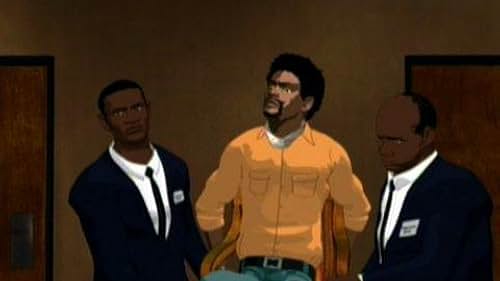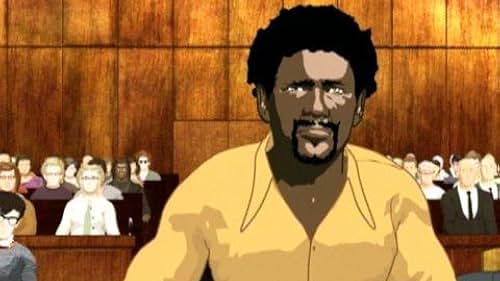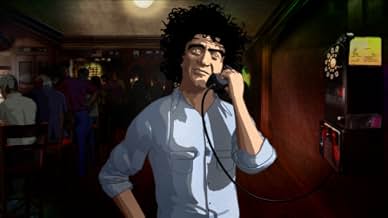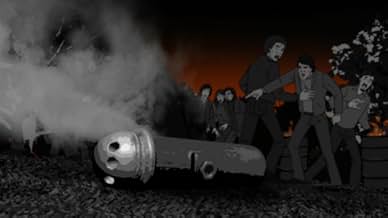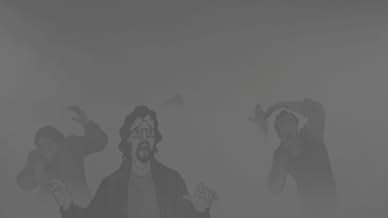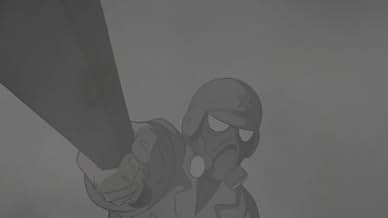IMDb RATING
7.3/10
1.5K
YOUR RATING
Archival footage, animation, and music are used to look back at the eight anti-war protesters who were put on trial following the 1968 Democratic National Convention.Archival footage, animation, and music are used to look back at the eight anti-war protesters who were put on trial following the 1968 Democratic National Convention.Archival footage, animation, and music are used to look back at the eight anti-war protesters who were put on trial following the 1968 Democratic National Convention.
- Awards
- 3 wins & 6 nominations total
Jeffrey Wright
- Bobby Seale
- (voice)
Nick Nolte
- Thomas Foran
- (voice)
Hank Azaria
- Abbie Hoffman
- (voice)
- …
Dylan Baker
- David Dellinger
- (voice)
- …
Mark Ruffalo
- Jerry Rubin
- (voice)
Debra Eisenstadt
- Mary Ellen Dahl
- (voice)
- …
Lloyd Floyd
- Robert Pierson
- (voice)
- …
James Urbaniak
- Rennie Davis
- (voice)
- …
Leonard Weinglass
- Self
- (voice)
David Boat
- Norman Mailer
- (voice)
- …
Julian Rebolledo
- Reporter 2
- (voice)
- (as Julian Dean)
Daniel Hagen
- Bailiff
- (voice)
- (as Dan Hagen)
Roger Jackson
- Marshal 2
- (voice)
- (as Roger L. Jackson)
- …
Ted Marcoux
- Robert Murray
- (voice)
- Director
- Writer
- All cast & crew
- Production, box office & more at IMDbPro
Featured reviews
CHICAGO 10 (2008) ***1/2 (Voices of: Hank Azaria, Dylan Baker, Nick Nolte, Mark Ruffalo, Roy Scheider, Liev Schreiber, James Urbaniak, Jeffrey Wright) Fascinating history lesson by way of state-of-the-art rotoscope animation about the infamous Chicago 10 trial of the 1968 anti-war demonstration at The Democratic National Convention led by "yippie" Abbie Hoffman curtailing into a monkey trial with dubious results and if anything a clear-eyed viewpoint of just how radical things were then and how it eerily reflects America's politics today. While the animation is hit-and-miss (and a bit eerie ala "Heavy Metal") the archival footage of the real-life instigators/participants is truly remarkable and should be seen by all who wondered what it was to live during a revolution. (Dir: Brett Morgen)
This is a really poorly movie. It may have been an interesting time in Amerikan history but this movie is far from interesting.
The makers chose to use really bad cartoons and actors to play the Chicago defendants. It doesn't work. The cartoons look nothing like the characters and their dialog is forced.
Frankly, a way better movie could have been made using only archival footage of the characters involved. It could have been truly compelling. Instead we got a really boring piece of celluloid that isn't even truthful to the events at hand.
Throughout the movie there are shots of the characters speaking to "crowds" and shots of massive numbers of people rallying. This is phony. It never happened. They inserted footage from other rallies to try to pretend these guys had such a following!
Shame on you.
And of course they never even mentioned that Jerry Rubin became a rabid capitalist after jail time ( I met him during his networking days in NYC) and Abbie Hoffman (who I always thought was the real deal) started dealing coke big time, went on the lam for years.
The makers chose to use really bad cartoons and actors to play the Chicago defendants. It doesn't work. The cartoons look nothing like the characters and their dialog is forced.
Frankly, a way better movie could have been made using only archival footage of the characters involved. It could have been truly compelling. Instead we got a really boring piece of celluloid that isn't even truthful to the events at hand.
Throughout the movie there are shots of the characters speaking to "crowds" and shots of massive numbers of people rallying. This is phony. It never happened. They inserted footage from other rallies to try to pretend these guys had such a following!
Shame on you.
And of course they never even mentioned that Jerry Rubin became a rabid capitalist after jail time ( I met him during his networking days in NYC) and Abbie Hoffman (who I always thought was the real deal) started dealing coke big time, went on the lam for years.
10kris-369
Just saw this at the Sundance opening. An absolute life changing film. There aren't words that could ever describe the feelings evoked by this extraordinary film. You could feel the heart and soul poured into every frame- and the mix of animation and incredible soundtrack was so moving. An absolute must see for anyone who needs to be reminded that they are the difference that is needed to stop the current war and the violence that is inherent today and since the beginning of time. This film leaves you feeling like standing up and taking flight and making a move toward what is truly important- the pursuit of peace and all that comes with-it- making a stand, courage, understanding yourself and your place in the world and knowing when to say when. I truly believe this film will change many lives.
In 1968 thousands of young people got angry and rioted as an unpopular President expanded an unpopular war overseas. As Ryan Harvey sung recently "The Times They *Aren't* A Chaning". The documentary footage from the protests is amazing, timely, and very reminiscent of news footage from recent political protests in North America. The animated sequences could have been better. They have the look of a very low budget show on Cartoon Network. Occasionally, a different kind of animation is used and this one is less realistic but much more effective. I'm not sure why this type of animation wasn't used throughout the trial sequences.
Roy Scheider I must add was very effective and creepy as Judge Hoffman, the authoritarian and one-sided judge who presided over the trial.
The movie is a reminder that things aren't changing but it's always important to fight.
Roy Scheider I must add was very effective and creepy as Judge Hoffman, the authoritarian and one-sided judge who presided over the trial.
The movie is a reminder that things aren't changing but it's always important to fight.
Brett Morgan's Chicago 10 might not deliver any groundbreaking revelations about one of the most notorious of protests-gone-bad sagas in American history, where after four days and nights (mostly) non-violent protesters and loaded-for-bear police clashed horrifically on the streets of Chicago and then the masterminds in the 'Yippies' (i.e. Abbie Hoffman, Jerry Rubin) were put on a trial where all were sent to some jail time. It's not about revelations, per-say, though one might say that the story itself- encompassing 1968's volcanic political and societal tumult- could be a revelation for some younger audience members numbed out by cable news and desensitization.
What it's about is presentation, of taking apart agitprop of the period, assembling it together with rotoscoping of the Chicago 7 trial, music from the likes of Rage Against the Machine, Eminem and the Beastie Boys, and loads of raw footage documenting much of the actual on-the-street and behind-closed-doors action in Chicago. It's probably the most striking sort one's seen since The Filth and the Fury, however in a context of instead 70s punk rock 1968's culmination of anti-war demonstration.
It's an ugly, breathtaking and (unlikely) savagely funny movie, where older viewers can experience their memories of a time and place in a sometimes bizarre and sometimes sobering context (of hindsight being '20-20') and younger viewers (i.e. guys and gals in their 20s and 30s) get a peek at an era that seems all the more ballsy in the perspective of America's involvement in Iraq. Morgan also does something a little dangerous, but successful, in portraying the "heroes" for all they were in this time and place: stalwart idealists in the guise of immature not-totally American insurgents whose 'spiritual experimenter' was oft-meditating poet-dude Allen Ginsberg. What to think of these men like Abbie Hoffmann and the leader of the Black Panthers? A little biased? Perhaps - but in light of how the trial went down, why carp?
It's editing is fast-paced, but not too much so, and its technique of animation is multi-faceted. On top of the rotoscoping (some of the best in recent memory along with A Scanner Darkly), there's a night-time demonstration done in 2-D, like something out of a nightmare with its somewhat primitive movement, and then the figures of the Chicago 7 appearing before crowds (usually with great voice-work from Hank Azaria, Dylan Baker and Mark Ruffalo, plus a great career finale from Roy Scheider as the cantankerous judge in the trial). It's the kind of visual assault that for the prepared is like a bit of ironic bliss.
If you've seen the trailer, or know a bit about the trial, or about Chicago in 68 (which Hunter S. Thompson, looking back in just 1972, said brought him to tears), or just about the friction between anti and the establishment, you'll know if this is for you. It certainly is like nothing else you'll see this year as a piece of sublime, subversive history. 9.5/10
What it's about is presentation, of taking apart agitprop of the period, assembling it together with rotoscoping of the Chicago 7 trial, music from the likes of Rage Against the Machine, Eminem and the Beastie Boys, and loads of raw footage documenting much of the actual on-the-street and behind-closed-doors action in Chicago. It's probably the most striking sort one's seen since The Filth and the Fury, however in a context of instead 70s punk rock 1968's culmination of anti-war demonstration.
It's an ugly, breathtaking and (unlikely) savagely funny movie, where older viewers can experience their memories of a time and place in a sometimes bizarre and sometimes sobering context (of hindsight being '20-20') and younger viewers (i.e. guys and gals in their 20s and 30s) get a peek at an era that seems all the more ballsy in the perspective of America's involvement in Iraq. Morgan also does something a little dangerous, but successful, in portraying the "heroes" for all they were in this time and place: stalwart idealists in the guise of immature not-totally American insurgents whose 'spiritual experimenter' was oft-meditating poet-dude Allen Ginsberg. What to think of these men like Abbie Hoffmann and the leader of the Black Panthers? A little biased? Perhaps - but in light of how the trial went down, why carp?
It's editing is fast-paced, but not too much so, and its technique of animation is multi-faceted. On top of the rotoscoping (some of the best in recent memory along with A Scanner Darkly), there's a night-time demonstration done in 2-D, like something out of a nightmare with its somewhat primitive movement, and then the figures of the Chicago 7 appearing before crowds (usually with great voice-work from Hank Azaria, Dylan Baker and Mark Ruffalo, plus a great career finale from Roy Scheider as the cantankerous judge in the trial). It's the kind of visual assault that for the prepared is like a bit of ironic bliss.
If you've seen the trailer, or know a bit about the trial, or about Chicago in 68 (which Hunter S. Thompson, looking back in just 1972, said brought him to tears), or just about the friction between anti and the establishment, you'll know if this is for you. It certainly is like nothing else you'll see this year as a piece of sublime, subversive history. 9.5/10
Storyline
Did you know
- TriviaNick Nolte and Liev Schreiber both played the roles Gregory Peck played in the remakes of Cape Fear (1962/1991) and The Omen (1976/2006).
- How long is Chicago 10?Powered by Alexa
Details
- Release date
- Country of origin
- Official site
- Language
- Also known as
- Chicago 10: Speak Your Peace
- Filming locations
- Production companies
- See more company credits at IMDbPro
Box office
- Gross US & Canada
- $177,490
- Opening weekend US & Canada
- $42,724
- Mar 2, 2008
- Gross worldwide
- $177,490
- Runtime1 hour 50 minutes
- Color
- Sound mix
- Aspect ratio
- 1.85 : 1
Contribute to this page
Suggest an edit or add missing content





